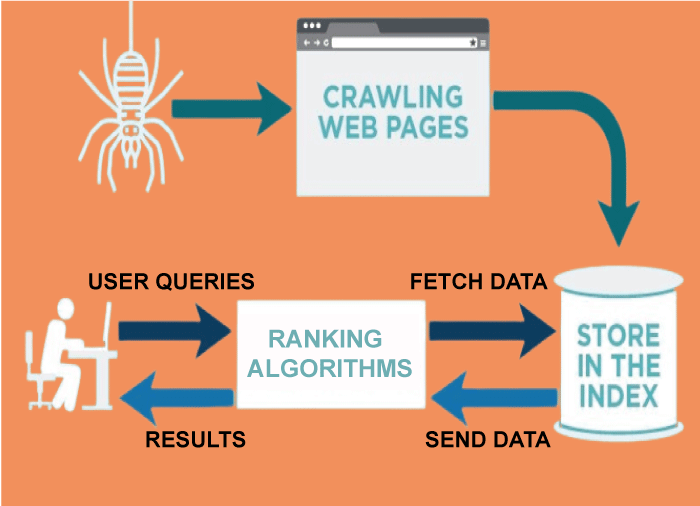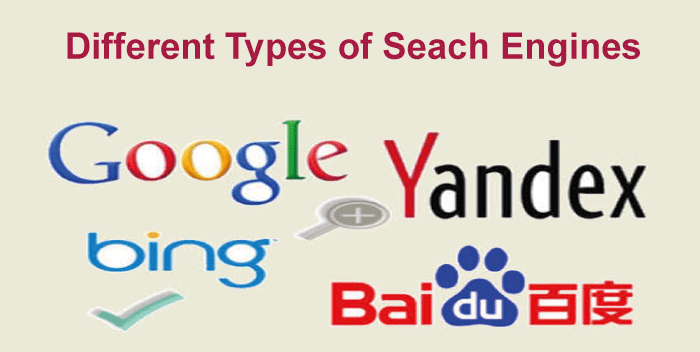Search Engine DefinitionA software program that is designed to carry out web searches is known as a search engine. They conduct systematic searches of the World Wide Web for specific information, particularly in a textual web search query. Search engine results pages (SERPs) are commonly used to refer to the presentation of the search results as a list of outcomes. 
A search engine searches its index of web pages for information that match to the user's query whenever the user types a query. Then the user can see the results in order of relevance. Links to websites, pictures, videos, infographics, essays, research papers, and other types of files could all be included in the content some search engines also mine data from open directories or databases. Search engines also retain real-time information by running an algorithm on a web crawler, unlike web directories and social bookmarking sites edited by human beings. Deep web refers to any internet-based content which cannot be indexed and searchable by a web search engine. History of Search EngineIn 1945, Vannevar Bush wrote "As We May Think" in The Atlantic Monthly. He described a system for finding published information intended to overcome the ever-increasing difficulty of finding information in ever-growing centralized indices of scientific work. In this article, he envisioned research libraries with connected annotations like modern hyperlinks. Through algorithms like Hyper Search and PageRank link analysis will eventually become a significant part of search engines. Birth of Search Engines in the 1990sIn addition to WHOIS user search dates back to 1982, and Knowbot Information Service multi-network user search, which was initially introduced in 1989. The earliest internet search engines existed before the launch of the Web in December 1990. Archie, who debuted on September 10th, 1990, was the first well-documented search engine that searched content files such as FTP files.The World Wide Web was entirely manually indexed before September 1993. On the CERN webserver, there existed a list of web servers which was edited by Tim Berners-Lee. One snapshot of the list from 1992 is present, but as more web servers came online, the central list could no longer follow up. New servers were announced on the NCSA site under the headline "What's New!". 
Archie was the first Internet search engine to look up content (as opposed to the users). The name is an acronym for "archive" (without the "v"). It was founded by Alan Emtage, a computer science student at McGill University in Montreal, Quebec, Canada. The Archie Search Engine did not index the contents of these sites because the amount of data was so small that it could be easily searched manually. Instead, the program downloaded the directory listings of all the files found on public anonymous FTP (File Transfer Protocol) sites, producing a searchable database of file names. In 1998, Google bought the concept of selling search phrases from a start-up called goto.com. The search engine industry was significantly impacted by this shift going from a struggling company to one of the most productive ones on the Internet. In the late 1990s Internet investing frenzy, search engines were likewise regarded as some of the brightest stars. Several businesses had stunning market entrances and saw record-breaking gains during their IPOs. Some have stopped selling enterprise-only editions of their public search engines like Northern Light. The dot-com bubble, a speculator-driven market boom that peaked in March 2000 which affected many search engine companies. Bias of Search EnginesSeveral political, economic, and social biases have been found in the information provided by search engines and in the underlying assumptions made about the technology. However, search engines are built to rank websites according to some combination of their popularity and relevance. These biases may be a direct outcome of political processes (such as removing search results to comply with local regulations) and economic and commercial processes (for example, businesses who advertise with a search engine may also become more prevalent in their organic search results). For instance, in countries like France and Germany where Holocaust denial is prohibited Google will not display specific neo-Nazi websites. 
As search engine algorithms are frequently created to eliminate non-normative opinions in favour of more "popular" results, biases can also originate from social processes. Major search engines indexing algorithms tend to cover more American-based websites than from other countries. One attempt to manipulate with search results for commercial, social, or political objectives is the practice of "Google Bombing." Researchers have looked at the societal shifts brought about by search engines and how controversial subjects like Irish terrorism, denial of climate change, and conspiracy theories are represented in the search results. Submission of Search EngineA webmaster submits a website directly to a search engine through online search engine submission. Even though search engine submission is occasionally promoted as a technique to promote a website in most cases, it is optional as the main search engines use web crawlers that eventually find most websites online without assistance. They can either submit a single web page at a time or the entire site using a sitemap, although usually only the home page of a website needs to be submitted because search engines can crawl a well-designed website. The only two reasons left are to add a brand-new website without waiting for a search engine to find it and to have the record of an existing website updated following a significant overhaul. Some search engine submission tools connect to websites from their pages and submit websites to various search engines. Given that external links are one of the most significant variables affecting a website's rating, this is beneficial in raising a website's ranking. But according to Google's John Mueller, this "can lead to a tremendous number of unnatural links for your site" and have a negative effect on site ranking. Importance of Search EngineSearch engines are critical tools for accessing the massive amounts of information available on the Internet. They enable users to access relevant information quickly and easily by putting keywords or phrases into a search box. Here are some of the reasons why search engines are important EfficiencySearch engines allow instant access to critical information by saving consumers time and effort in locating what they search for. AccessibilitySearch engines make information available to people worldwide regardless of their location or level of knowledge. RelevanceSearch engines are constantly improving their algorithms to provide more precise and appropriate search results by helping users to get the information they need faster. Business GrowthSearch engines significantly drive website traffic which is critical for businesses looking to expand their online presence and customer base. ResearchResearchers, scientists, and students benefit from search engines because they enable access to scholarly journals, research papers and other academic resources. How does a Search Engine Work?How does a search engine select the most relevant websites from the thousands available online? How do we see these pages on our screens? What are the prerequisites? 
To execute the user's query, the search engine takes three steps. CrawlingCrawling is the first step in discovering new web pages on the Internet. All search engines use web crawlers or spider bots to follow links to new web pages in the known ones. They gather data by crawling from site to site. After gathering the data, it is indexed. While indexing is taking place, the spider continues to discover new pages. The spider stops crawling when a specified period has passed or based on the amount of data obtained. IndexingOnce the data has been crawled, it is sent for indexing which saves data on the search engine's database stated as the index. The index's job is to find information linked to the query as quickly as possible. This procedure can be completed quickly by using any of the following steps:
To appear in search results any website must be indexed. When a query is entered, the index results are sometimes returned rapidly because it has previously saved a few internet links containing the keywords. RankingThe last step is to rank the outcomes on the SERP. The search engines have their criteria for listing search results. These signals or criteria should be visible to the general public. The ranking algorithm determines the order of the web links on the results page. One of the most frequently asked questions is if all search engines produce the same results and the answer is only sometimes. Each search engine has an algorithm that it uses to do web searches. These searches are also influenced by criteria such as your location, what other people preferred for the exact phrase, your previous searches and so on. As a result, different search engines produce different results. Top Search EnginesSearch engines are technologies that help people find information on the internet. They are intended to assist users in the discovery of web pages, photographs, videos, news stories, and other sorts of online content. 
Here are a few search engine examples Bing (renamed as Microsoft Bing in October 2020)This is nearly as common as a Google search. The default search engine on a Windows PC is Bing. There are certain parallels between Google and Bing regarding search results such as images, videos, places, maps, and news. Despite Microsoft's efforts to make it as successful as Google, it currently has only 2-3% of the total search engine market share. YahooYahoo used to be one of the most popular websites to visit. It is exclusively given by Bing. It is also the default setting for Firefox users in the United States. BaiduThis is a well-known engine in China. Despite its low popularity, Alexa reports its market share is growing globally. It is available worldwide but only in Chinese. YandexYandex.ru is a well-known search engine in Russia, Ukraine, and Turkey. It gets its name derived from Yet Another Indexer. It accounts for less than 1% of the overall search engine market. DuckDuckGoThis unpopular search engine accounts for approximately 0.45 percent of the market. Small search engines such as Bing and Yahoo are also competitors. Unlike most search engines, it does not maintain its own search index and instead relies on several sources. In other words, it lacks its own data and relies on third-party sites such as Yahoo, Bing, and others. But what distinguishes it from the rest is that it is considerably cleaner and free of junk advertisements. ConclusionThe perfect search engine does not exist. Google's algorithm may be better than others, but that does not guarantee that it will always produce the top results. With the immense amount of information accessible through the internet, search engines are now an important tool for both personal and professional use, allowing users to quickly obtain the information they require with a few clicks. Several up-and-coming search engines have been competing for the title of most popular search engine. Try each of these search engines for yourself, then choose the one that provides the best answers to your query.
Next TopicSinus Definition
|
 For Videos Join Our Youtube Channel: Join Now
For Videos Join Our Youtube Channel: Join Now
Feedback
- Send your Feedback to [email protected]
Help Others, Please Share










